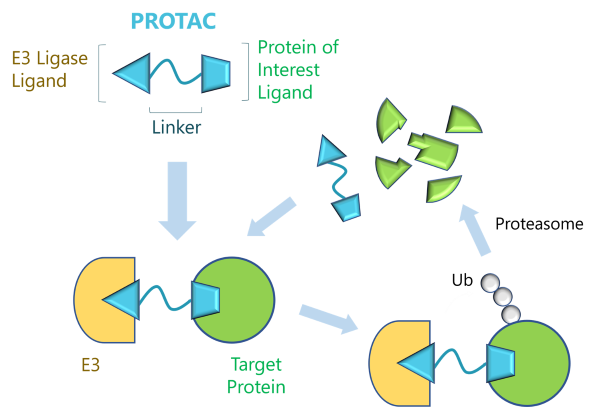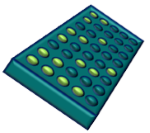Targeted Protein Degradation
Targeted protein degradation strategies have invigorated drug development, enabling therapies for targets previously deemed “undruggable.”
Targeted protein degradation strategies have invigorated drug development, enabling therapies for targets previously deemed “undruggable.”
Targeted protein degradation (TPD) is a cutting-edge approach in drug discovery that aims to selectively remove disease-causing proteins from cells. Traditional drug development often involves designing molecules that inhibit the activity of specific proteins, but TPD takes a different route in using cellular protein degradation mechanisms to facilitate protein elimination. One of the prominent strategies is the use of Proteolysis-Targeting Chimeras (PROTACs®). PROTACs are bifunctional molecules composed of a ligand that binds to the target protein and another ligand that binds to an E3 ubiquitin ligase, which is an enzyme responsible for tagging proteins for degradation. By bringing the target protein and the E3 ligase into close proximity, PROTACs facilitate the ubiquitination and subsequent degradation of the target protein by the cellular proteasome.
PROTAC-induced protein degradation provides several advantages over traditional small-molecule inhibitors. Firstly, PROTACs can target proteins that are considered "undruggable" by conventional methods. Secondly, the degradation process is not dependent on inhibiting the catalytic activity of the target protein, potentially reducing off-target effects, as well as reducing the emergence of resistance mutations. Thirdly, PROTACs offer a prolonged and sustained effect on protein levels, due to molecule recycling where the same PROTAC molecule can affect a large quantity of the target protein. This approach holds great promise for treating a variety of diseases, including cancer and neurodegenerative disorders, by selectively eliminating specific proteins involved in the pathology.

Multiple other TPDs are also in development including molecular glues, Lysosome-Targeting Chimeras (LyTACs), Antibody-based PROTACs (AbTACs), and more. Despite the exciting potential of TPD strategies, there are challenges in their development. Designing effective TPD molecules requires careful optimization of ligands for both the target protein and the E3 ligase, considering factors like affinity, specificity, and cell permeability. In addition, linkers must be optimized for length and composition for each E3 ligase and target. As researchers and pharmaceutical companies continue to explore and refine this innovative approach, the promise of TPD therapeutics may bring about a new era in precision medicine.
PROTAC® is a registered trademark of Arvinas Operations Inc., and is used under license.
Robust solutions for TPD drug discovery and development
PROTAC® Optimization Kits

- Proximity-based assays designed for rapid and sensitive quantitation of PROTAC screening and characterization against a specific E3 ligase and a specific protein of interest.
- View Products
PROTAC® Linkers & Ligands

- A large selection of available linkers and ligands for PROTAC development.
- View Products
TPD Recombinant Target Proteins & E3 Ligases

- With or without tags, including Avi-tag, FLAG, His, Fc or biotin for binding assays or WB controls.
- View Products
Product Results
Inquiries
│Featured Products & Services
- PROTAC Optimization Kits
- PROTAC Linkers and Ligands
- TPD Custom Services
- TPD Recombinant Target Proteins
- Ubiquitinase/Deubiquitinase Screening & Profiling


